What is a legacy?
It’s planting seeds in a garden you never get to see.”
Laura Ingalls Wilder got to see some of the harvest from her series of nine Little House books, published between 1932 and 1971, but the books have been out long enough that additional, unexpected seeds have sprouted.
I first read the books when I was eight and reread them multiple times. The series was the first I bought for my children, because I needed Laura in my home library. So in June, when the American Library Association (ALA) renamed the Laura Ingalls Wilder Award the Children’s Literature Legacy Award, thereby removing her name, I was upset. I called two Laura-loving friends, and we commiserated.
The award was created in 1954 by the ALA to honor an author who makes what it deems a “significant and lasting” contribution to children’s literature. The award has also been given to Eric Carle, Beverly Cleary, Tomie dePaola, Katherine Paterson, Maurice Sendak, and E.B. White, among others. In renaming the award, the ALA put out a press release explaining the decision. Here’s part of what it said:
Wilder’s books are a product of her life experiences and perspective as a settler in America’s 1800s. Her works reflect dated cultural attitudes toward Indigenous people and people of color that contradict modern acceptance, celebration, and understanding of diverse communities.”
What sorts of “dated cultural attitudes”?
Well, there’s the refrain in Little House on the Prairie, “The only good Indian is a dead Indian,” or when Pa appears in blackface in Little Town on the Prairie. When I was eight, those incidents did bother me, but they did not hamper my enjoyment of the books. Shouldn’t they have?
The first time objections were officially raised to Wilder and her publisher was in 1952. The writer, a mother, speaking for her child, brought up two sentences, which have since been reworded: “ … there were no people. Only Indians lived there.” Now it reads, “Only settlers lived there.”
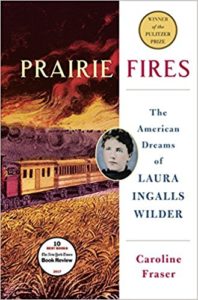
So how do I, as a book-reader and a book-buyer for children, address the issues the ALA raises?
I’ve loved Laura for forty years. I also don’t want to propagate racist attitudes. Searching for answers, I went online.
The Twitter feed of Margaret H. Willison, a librarian, caught my eye. She co-writes a newsletter I subscribe to and frequently appears on a podcast I love. She tweeted this about the ALA’s decision:
In few fields is the issue of unalloyed reverence more thorny than that of children’s fiction because the things you love at 8 become a part of you forever.”
Her words reminded me of a quote from children’s author Diana Wynne Jones, as recorded in Reflections on the Magic of Writing:
Most adults, in fact, if you question them, will admit that there was this marvelous book they read when they were eight, or ten, or maybe fifteen, that has lived in their minds ever since.”
When I was a young reader, I overlooked things that bothered me in Wilder’s books. I’m white, and I have that luxury. But how might I have reacted if I were reading the Little House books as an eight-year-old Black or Indigenous girl? How might those stories live in my mind and become part of me forever in a wholly different, disturbing way?
Here’s the irony — I live in an area settled by Germans in 1846 on land that belonged to the Comanche. The Meusebach-Comanche Treaty is touted as a symbol of cooperation between the two groups. I know the German side of the story, but I’d love to hear the same story told by the Penateka band of Comanche who lived here first.
In making the name change, the ALA clarified that it was not attempting to censor Wilder’s books.
This change should not be viewed as a call for readers to change their personal relationship with or feelings about Wilder’s books. Updating the award’s name should not be construed as censorship, as we are not demanding that anyone stop reading Wilder’s books, talking about them, or making them available to children. We hope adults think critically about Wilder’s books and the discussions that take place around them.”
So, yes, read Wilder’s Little House series, but also read Louise Erdrich’s The Birchbark House series about an Ojibwe girl named Omakayas, whose family was forced to leave their home by white settlers. Read about Cassie Logan, a Black girl facing racism in Mississippi during the Great Depression in Mildred D. Taylor’s Roll of Thunder Hear My Cry. And read the author who is the first recipient of the newly named Children’s Literature Legacy Award, Jacqueline Woodson.
That’s why next month’s Children’s Book Club selection is Woodson’s Brown Girl Dreaming, which won the National Book Award and the Coretta Scott King Award, and was a Newbery Honor Book. It’s a collection of poems that form a memoir about a girl who is strong, like Laura and and all the girl characters I loved at eight and ten and fifteen and still love.
Name a girl Jack, my father said,
and she can’t help but
grow up strong.
After a month of reading wildly on the subject of Wilder’s legacy, I think I want there to still be a Wilder award, but I want it to belong to only one author: Laura Ingalls Wilder. She did not live to see all the fruits in her garden, but I think the world is wide enough for her and Omakayas and Cassie and Jackie and all other girls whose legacies we are only now getting to see.
_______________
Next week, we’ll continue with the Problem of Laura Ingalls Wilder, the girl known as Half Pint.
Photo by James Loesch, Creative Commons, via Flickr. Post by Megan Willome, author of The Joy of Poetry.
Browse more children’s stories
“Megan Willome’s The Joy of Poetry is not a long book, but it took me longer to read than I expected, because I kept stopping to savor poems and passages, to make note of books mentioned, and to compare Willome’s journey into poetry to my own. The book is many things. An unpretentious, funny, and poignant memoir. A defense of poetry, a response to literature that has touched her life, and a manual on how to write poetry. It’s also the story of a daughter who loses her mother to cancer. The author links these things into a narrative much like that of a novel. I loved this book. As soon as I finished, I began reading it again.”
—David Lee Garrison, author of Playing Bach in the D. C. Metro
- Perspective: The Two, The Only: Calvin and Hobbes - December 16, 2022
- Children’s Book Club: A Very Haunted Christmas - December 9, 2022
- By Heart: ‘The night is darkening round me’ by Emily Brontë - December 2, 2022
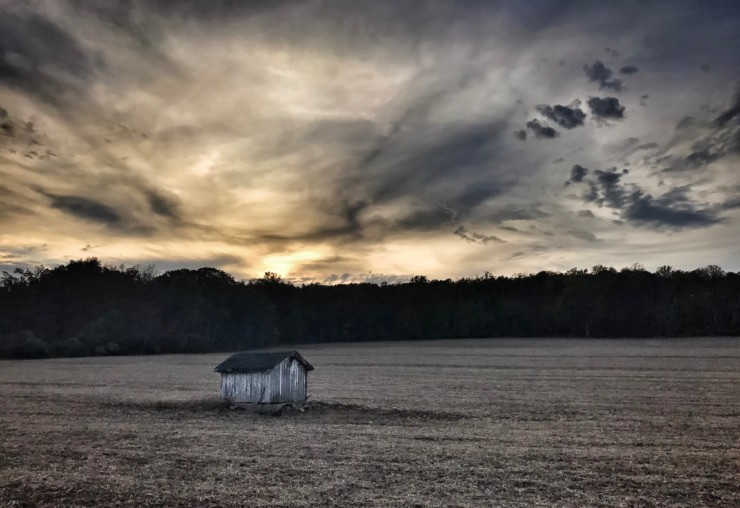
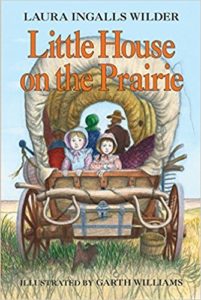
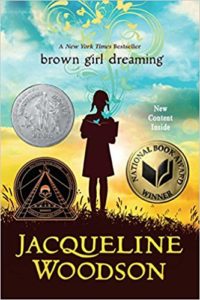
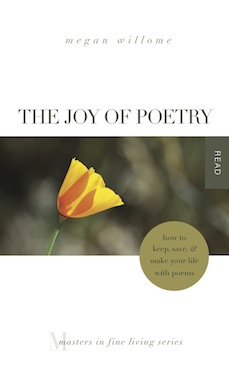
Glynn says
The American Library Association has the right to call its award anything it wants to call it. Where the issue arises is when it explains, or tries to explain, why. And it’s unfortunate but predictable that, in this age of “everything is politicized,” the name of an award falls into the politicized abyss. Was the ALA acting in the interests of social justice? Was it merely “virtue signaling”? The answer is likely some of both.The librarians consider this to be a good thing, and one of the tenets of public relations is to be “discovered doing good things,” even if you have to announce it.
I believe Wilder and her publisher were involved in the decision to change the text. Her original lack of reference to native Americans as people reflected the norm in the 19th century and well into the 20th. That norm justified a whole range of horrible behaviors towards them, from stealing their land, violating treaties, forcing their children into Anglo schools, massacres, and more. (This wasn’t just an American norm; this happened in Australia, Canada, Africa, India, South America, and other places.)
L.L. Barkat says
Actually, I think you’ve hit on an exact reason of why librarians need to take this seriously. Yes, they must be caught doing good things, because the basis of literacy work is to bring people, ultimately, to good places through reading. As such, it bestows a serious measure of responsibility on the “bringers.” Like being a parent (oh, do ask me), it is not always fun to be the one with responsibility. It puts us in places where we are watched and asked to explain ourselves. That’s not all bad (I do remember, keenly, how I was sometimes a better parent when others were around me); social life functions as a corrective, or it can.
I do like the questions Megan asks. They are real, very real. How does it feel to read literature that calls you names? It feels very hard indeed. How does it feel when that literature is the measuring stick for what is good? It feels like you are being called names all over again, with the blessing of those who “do good.” It is difficult to appreciate this when we are not the ones whom the names are naming.
All this said, I will always love what the Wilder books teach us about the heart. The best hearts see deeply, feel deeply (the strawberry butter molds! the watermelons by the creek!)—and sometimes are blind to their own neglect of others’ hearts.
What I appreciate is when we can open our hearts to each other and say, “This is how it feels to me,” and still be friends. To that end, I wonder how we can pull back from the ordinary labels of what’s happening and re-enter conversations, really hearing one another (in other words, how we can have important conversations without them collapsing into “types” such as “politicized”). Maybe it begins with questions?
Or stories, even. Which takes us to Woodson. Which is a great next place to go.
Megan Willome says
Glynn, I can’t tell you how much I’ve struggled with this entire thing. It’s why I wanted to write about it, because my initial reaction was very similar to yours. I was also struck by the fact that the ALA’s decision to change the name of the award was unanimous.
You’re absolutely right that Wilder’s books reflect not only American norms of the time but also also norms in other parts of the world, especially parts that were colonized. I came away from this month of Laura-ness still loving her but wanting more stories from everyone, from every perspective.
I’ll talk next week more about why I think her books still need to be read.
L.L. Barkat says
Yes, me too, Megan. I felt an initial pang, a disappointment.
But, going forward, to how you put it, I really like the word reaction, because it suggests the visceral. The next step, for me, is always to ask: what is that, that I just experienced without thought? What place is that coming from? And, given the choice, is that where I want to stay?
Laura Lynn Brown says
Great questions.
L.L. Barkat says
I wish you could hear the conversation we’ve been having here at my house about this (I don’t have the energy to repeat the opinions from my eldest daughter, but it lands somewhere between what Glynn said and the spirit of what I said)—a lot about what the stated purpose of the award is, how to do things in less of a fanfare way so the focus of people’s energy can be harnessed in the best ways, the complications of being a big organization and trying to do things without fanfare (this part is me talking), the way that old literature feels old in many aspects (and the cultural attitudes sitting within that and also, potentially, feeling old, even embarrassingly so—do children get that? do they feel it? or does the “old” still judge and harm them in new times?), how a lot of “lasting literature” has many inappropriate things in it to the modern ear, and so on.
How complicated it ends up being—to be the keepers of literacy and awards keys. 🙂
Megan Willome says
I wish I could hear it too! I’d love to hear conversations about this in homes across America because I don’t think the answer is cut and dried. Literature that lasts does so for a reason (or many reasons). That’s why there is a part 2 to my discussion of Wilder.
I have not given any thought to the question of fanfare. It’s important.
Debbie says
How timely this article! Just today I visited the Laura Ingalls Wilder Musuem in Pepin, Wisconsin. I hadn’t read this article yet but I asked her what she thought about her name being removed from the award. She understood their reasoning, but also explained that we have to understand the times she was writing in. Indians were not welcoming toward the people coming into their territory. Caroline most likely heard horror stories about them and her view was passed on to her girls. Megan, as you delve more into this topic, I would recommend you call the museum and speak with this Wilder historian. I also asked her about the controversy as to whether Laura wrote the books or her daughter Rose did. She trusts that Laura did the writing but Rose did edit and give direction.
Don’t throw tomatoes, but I’m so tired of people being offended by every little thing. It’s an epidemic. You know what I find offensive? When “God,” “Jesus Christ,” or “Lord” are used as expletives. That’s common language and you never hear anyone say “Buddha Damn it” or “Oh, Allah!” Can you imagine the outrage if one did? But let the world blaspheme the name of Christ and no one cares!
Megan WIllome says
Thank you, Debbie. I’d love to visit all the Laura sites someday, as Wendy McClure did in “The Wilder Life.”
I think you’d really love “Prairie Fires.” Caroline Fraser goes into great depth about all the issues you raise here.
Debbie says
I am adding it to my reading list.
Sandra Heska King says
So I was pretty mad at first. But I don’t think I would have even noticed if the ALA had just quietly changed the name and didn’t make it a big deal. (This discussion did lead me to go explore all the ALA awards and their origin.)
I just still have mixed feelings about the whole thing. We have family who is Native American, and so I’m privy to and sensitive about their treatment–and current privileges. On the other hand, my husband has ancestors who were killed in awful fashion and their house burned by Delaware Indians–because the father (who was Amish) would not allow the family to fight. (The father and two sons were captured–the father eventually escaped, and at least one of the sons was returned seven years later under some treaty–though he found it very hard to adapt to a “new” life.) The whole story has been passed down and preserved in a written family history.
When we visited Hemingway’s Home in Key West, I wanted to pick up a book of his poetry. I was so offended at some of his word choices after initially thumbing through it, I just couldn’t buy it. Which may be my loss since he was writing in another time and another place. How do we learn if we only read what makes us comfortable? Maybe I’ll go ahead and buy it when we go back in a couple of months.
I do appreciate how the TV show made an effort to address some really hard things.
Anyway, I guess I’m okay with the name change–I just wish the ALA hadn’t made such a big deal. On its award page, it lists the award as the Children’s Literature Legacy Award–with the explanation about the change. Underneath it, the subtopics refer to Wilder’s award and lists all the past recipients.
I have a stack of Laura books, letters, and writings, and those written about her. I haven’t read them all, but Laura has been part of me for as long as I can remember. It’s not the references to “dated cultural attitudes” that I most remember. But if we strip away or hide both sides of the past, how do we live in the present? Where is the room for conversation?
I’m really looking forward to part 2.
Megan Willome says
“But if we strip away or hide both sides of the past, how do we live in the present? Where is the room for conversation?”
Sandy, I think you’ve hit on the crux of this dilemma. Your family stories illustrate the truth that there are so many sides to the past, and if we start telling one side or the other to keep quiet or hide themselves then we hurt ourselves in the present. I join you in wanting conversation. And I think these are going to be hard conversations.
Here’s an interesting thing I learned over my month of reading: The Dakota, who lived in the Little House in the Big Woods area, were the enemies of the Ojibwe, as in Omakayas’ people from The Birchbark House. Here’s a line about that from Prairie Fires: “Whites lumped them together as ‘Sioux,’ a name the Dakota found insulting. ‘Sioux’ was what their enemies, the Ojibwe, called them. It meant ‘little snakes.'” Complicated, indeed!
Sandra Heska King says
Yes, complicated. All around.
L.L. Barkat says
Complication upon complication. This is important to recognize, isn’t it?
In my conversation with Sara about this, she felt the ALA should have “quietly changed the name” or “quietly retired” the old award and started a new one. I liked that idea. Then I asked her three questions:
• what is lost if the award just goes away and resurfaces as something that seems brand new?
• is it possible to do something “quietly” when you are as big as the ALA?
• for a moment, consider what would happen if the Caldecott just “quietly” disappeared?—How does this inform this issue?
I’m so glad Megan, that you chose to tackle this hard conversation. One upcoming theme in the Friendship Project will be “difficult conversations,” and there’s so much to practice in having them. Openness and API (assume positive intent) might be the beginning. Your own post demonstrates that beautifully, even while you express your unhappy reaction to the choice. (I don’t believe the answer is to cover our feelings and thoughts, in other words, but I do believe that something akin to grace is always in order when we converse. And, along with that, true curiosity about how the “other side” thinks. You do both of those so well, too.)
Megan Willome says
Thank you. That’s very kind.
As to the questions you raised, I was only dimly aware the Laura Ingalls Wilder Award existed. But I do know the Newbery and the Caldecott, and I’d gone online to look for the winners, so I could then look them up. That was the context in which I discovered the news about this award. I think that made the news that much more of a gut punch.
L.L. Barkat says
It’s fascinating to me how emotional this is for some. Maybe it’s because I run an organization myself, but I am not having the same level of response (even though Laura was a big part of my growing up and even shares my name, and that always meant something important), and I feel like it’s something that people both have some purview to have (and share) heated responses over and, well, not. I’m trying to wrap my mind around if Tweetspeak changed a program, or the name of a program, or anything else, really, and the public responded as such.
Which brings up fascinating questions about the relationship between an organization/business and the public that participates in its life. What are the boundaries? What are the responsibilities, on each side?
Megan Willome says
I suspect there is something, under the purview of some organization, that if it changed, you’d have a visceral reaction.
Once I had a dog who tore her ACL. She was a rescue puppy, as all our dogs have been. When I took her to the vet, they did an x-ray and found that leg had been broken a long time ago and healed badly. So sometimes I think we don’t know our sensitivities until something happens—maybe something not even related to the issue at hand—that touches another something deep within us.
L.L. Barkat says
Yes, yes there would be. (Thank you, before I go forward with further thinking here, for staying with this conversation so graciously—by which I mean, urging ever towards the truths in your heart and in the situation but also, to put it M.F.K. style, with “so many wide windows.”)
The conversation here continues to play over in my thoughts. The visceral, I have felt. The unfolding, you are doing. Tomorrow’s post is such a beautiful part of that unfolding. It asks, in its way, the question raised above: “What place is that [response] coming from?”
The place, as you so deeply put it, is often hidden to us, like a past injury. But it needn’t be injury, either. Maybe it was dream. Maybe it was hope. Maybe it was our secret solace and refuge. Or even our greatest inspiration! Then someone comes along, doing business (which is their job and their responsibility, if it’s an organization) and says, “That place you lived in, in your mind. It was on the wrong side. That thing you loved. That space you existed within. Some of it came at others’ expense, and we’re going to, therefore, take it away, at least in the arena that’s under our care, because there are people to consider—other children, in the Now.”
!!!!!!!!
But… how… my…oh…no…
Those parts you speak of: those were not the parts I held to my heart. There’s so much more. And so much good.
My love.
My place.
My past.
My hope.
My solace.
My dream.
Maybe even what helped me survive, or thrive in a time and space where exterior realities would have caused otherwise.
Please don’t take that away from me.
It is so worth doing the unfolding, whether that be painful or marvelously eye-opening (or even, oddly, both).
Thank you, Megan, for doing yours, and for inviting us to do ours.
Megan Willome says
Oh, the idea of this turn happening to that thing “what helped me survive.” Ay yi yi.
Thank *you* for deep diving.